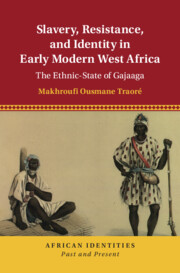Book contents
- Slavery, Resistance, and Identity in Early Modern West Africa
- African Identities: Past and Present
- Slavery, Resistance, and Identity in Early Modern West Africa
- Copyright page
- Contents
- Figures
- Tables
- Preface
- Acknowledgement
- Introduction
- Part I Between the Sahara and the Atlantic Ocean
- Part II Atlantic Slavery, Kingship, and Worship of Nature
- Part III Gajaaga at the Center, the French Empire at the Edges
- 5 Resisting the French Empire
- 6 Bridging Empire and Hinterland
- Conclusion
- Bibliography
- Index
6 - Bridging Empire and Hinterland
Ayuba Suleyman Diallo: Powerbroker and Empire Maker
from Part III - Gajaaga at the Center, the French Empire at the Edges
Published online by Cambridge University Press: 16 November 2023
- Slavery, Resistance, and Identity in Early Modern West Africa
- African Identities: Past and Present
- Slavery, Resistance, and Identity in Early Modern West Africa
- Copyright page
- Contents
- Figures
- Tables
- Preface
- Acknowledgement
- Introduction
- Part I Between the Sahara and the Atlantic Ocean
- Part II Atlantic Slavery, Kingship, and Worship of Nature
- Part III Gajaaga at the Center, the French Empire at the Edges
- 5 Resisting the French Empire
- 6 Bridging Empire and Hinterland
- Conclusion
- Bibliography
- Index
Summary
The chapter describes the involvement of local traders who mastered the political and diplomatic networks of Senegambia, as well as the social realities of Gajaaga. Unlike the French companies, which depended on Europeans, many of whom faced constant political and social difficulties in Gajaaga, the British opted for local traders or at least for foreigners who had a command of local languages and Arabic, which was spoken fluently in Upper Senegal. This chapter depicts the flexibility and the decision-making power of African agents such as Ayouba Diallo, revealing their intellectual and social capacities to create networks within the European aristocracies through diplomatic negotiations. The history of Ayouba is known to historians only by virtue of the unusual character of his enslavement and his peregrinations upon returning to Africa after being freed. The chapter goes back over an unusual phase in Diallos life: his political and diplomatic activities in Gajaaga; his connections in Bundu and London; and his involvement in the rivalries between England and France in Gajaaga. It shows that what lent the sixteenth to the eighteenthh centuries their cosmopolitan, globalized aspect was the expertise and know-how of individuals familiar with navigating the diverse networks of the Atlantic system, Diallo being a prime example.
- Type
- Chapter
- Information
- Slavery, Resistance, and Identity in Early Modern West AfricaThe Ethnic-State of Gajaaga, pp. 367 - 408Publisher: Cambridge University PressPrint publication year: 2023



